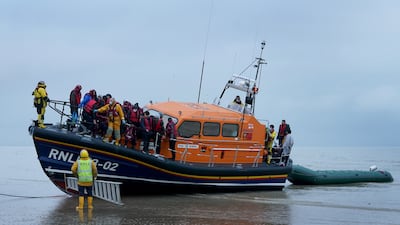People smugglers and the companies who supply them with boats to take migrants across the English Channel will be hit with the “full arsenal” of sanctions, the UK’s Foreign Secretary, David Lammy, has said.
Mr Lammy announced that Britain will become the first country to bring in a sanctions regime targeting organised immigration and irregular migration. The sanctions are the latest phase of government plans to reduce small boat crossings across the English Channel and cut migration.
Criminal networks are profiteering by exploiting and trafficking vulnerable people by aiding irregular migratory movements, including sea crossings across Europe.
The plans have not yet been finalised but the move is likely to operate on similar lines to other sanctions, resulting in asset freezes and travel bans for people or firms where there are “reasonable grounds to suspect” involvement in smuggling. The sanctions would prevent them from using UK financial institutions to invest or move money.
If the new initiative echoes Britain’s other tactics, such as those aimed at tackling terrorism, cyber attacks or Russians linked to the war in Ukraine, breaches of sanctions could be a criminal offence, punishable by up to seven years in prison.
Mr Lammy was asked about how effective sanctions would be in disrupting criminals who use informal financial networks, such as Hawala banking.
He acknowledged “there is an informality to those cash networks” but said there were businesses involved in the manufacture, the storage, the transportation” of the “flimsy boats” that are getting people across the Channel.
He said there are known companies that “sit behind” the operations. “We can go after those value chains and those supply chains.”
“We can go after these smugglers, these traffickers, these criminals that are moving people across waters. Seventy-eight people died last year in the Channel, and I'm going to bring the full arsenal of the Foreign Office to bear down on those value chains and those criminal networks.”
Mr Lammy used the example of the companies who make engines used to power the boats whose bank accounts and assets could be frozen in a bid to “cripple” people smuggling.
“Let's go after the manufacturers of those engines, many of whom are in China. Let's deal with the organised criminals who are not just trafficking people, but they traffic guns and other things.”
He acknowledged that financial sanctions against those involved in small boat crossings are “not the whole solution”, but could be a “significant part of the solution”.
In a speech at the Foreign Office, Mr Lammy said a “realistic strategy involves transactional, hardheaded diplomacy, and to agree with partners, smart interventions at every stage along the international people smuggling pathway. So together, we can strengthen borders, smash the gangs and get those with no right to be here returned to their countries.”
'Jungle' migrant camp in Calais – in pictures
Mr Lammy wants Britain to be the first country to “develop legislation for a new sanctions regime specifically targeting irregular migration and organised immigration crime”.
“This will help to prevent, combat, deter and disrupt irregular migration and the smuggling of migrants into the UK,” he said.
Lawyers who specialise in sanctions and financial crime expressed doubts over the measures. Angelika Hellweger, legal director at Rahman Ravelli, said the proposals “look good, but whether they’re feasible remains to be seen”.
“These smugglers are using unofficial banking systems such as Hawala,” told The National. “Obviously, the people at the top of the businesses will have a lot of money but individuals lower down probably not, so you have to go after the big fish.
“It’s difficult to find these people smugglers and to go after them in other countries,” she said. “It’s like looking for a needle in a haystack.”
John Binns, a partner at BCL Solicitors, said the proposed sanctions were “legally very possible, but practically difficult”. He had doubts the initiative was “the right tool for the job”.
“You would query exactly how you find the people doing this stuff,” he said. “I'm not sure it's that easy because if it was then it would be happening already.”
Mr Binns said more traditional methods, such as seizing the assets of those involved in crime, could be a “more practical” way to tackle people smugglers.
British Prime Minister Keir Starmer pledged to “smash the gangs” as part of efforts to stop small boat crossings. This also includes UK law enforcement officers working in Iraqi Kurdistan, which has become a centre in the people trafficking business.
“We must dismantle the crime gangs facilitating breaches of our borders. By crippling illicit finance rings allowing smugglers to traffic vulnerable people across Europe, we will deliver on our Plan for Change and secure UK borders,” he said. “That means being bold and innovative in our policy-making to ensure we are leaving no stone unturned. My government will do everything in our power to save lives and protect our borders for years to come.”
Mr Starmer was due to discuss the issue of small boat crossings with France's President Emmanuel Macron on Thursday after the number of migrants arriving in the UK after crossing the Channel was 25 per cent higher last year than in 2023. At least 36,816 people made the journey last year, up from 29,437 the year before. However, the total was down 20 per cent on the record 45,774 arrivals in 2022.
Today's announcement is in addition to penalties announced by the Home Office last week that will see suspected people smugglers face immediate travel and social media bans as well as restrictions on phone usage.
The UK government has already started initiatives to stop the operations of people trafficking networks and irregular migration, including hosting the European Political Community and the Calais Group, which brought together ministers from France, Belgium and the Netherlands alongside EU agencies. It has also improved working agreements with countries like Moldova, Iraq and Vietnam on returns, and announced a new anti-Smuggling Action Plan signed with other G7 nations.





















